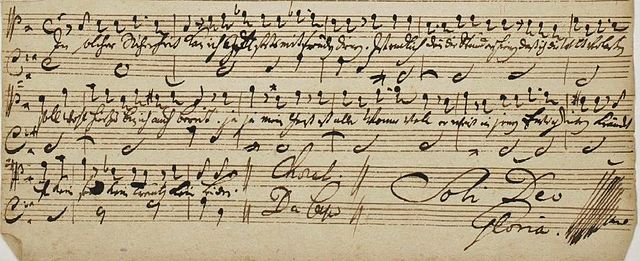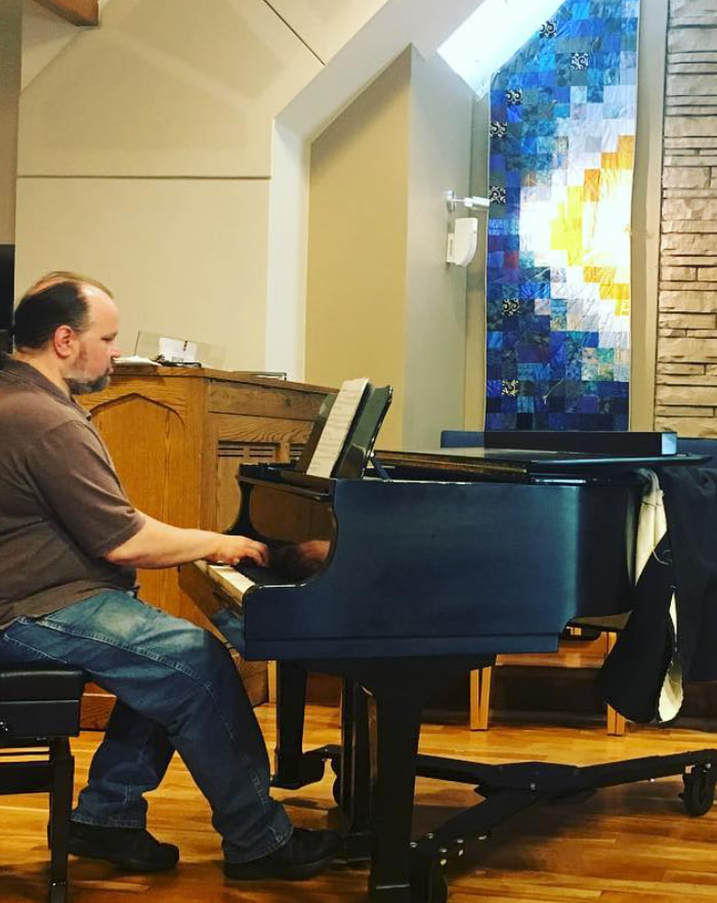|
"I am a DJ. I am what I play" - from the David Bowie song "D.J." (1979) I found myself musing recently about the role of music in worship. It's a nearly moot internal discussion at this point for me, as my body has been essentially hijacked to show up at a church on Sunday morning and play music. Conduct. Something. This benign captivity began at the young age of 10 years old and is clearly not going to end until I do. Being a church musician and music director is in my blood, as they say, and it's terminal. I have no qualms about this self-diagnosis, by the way. But the initial question is still one worth exploring: what is the role of music in worship?
Music seems like a very natural choice in a gathering where the sublime aspects of our humanity — our connection with the Divine — are enticed to rise to the surface. The diverse unspoken language of music can offer us a glimpse into this mystical space. At the very least, it can be a visceral prayer without words. Different vibrations can unlock a whole world of experience in listeners, not as aural entertainment but embodied joy, love, peace, prayerfulness, sorrow, and a myriad other affects that are part of the Jesus story and God's wonder of creation. Sometimes we are not prepared to hear those frequencies, for whatever reason, but what binds all those sonorities emitted in our Beloved Community will always be intent. The questions I ask myself when programming music for worship include: Does the music accentuate and complement the minister's message and scripture reading in an empowering and nuanced way? Does the affect of the music serve the Spirit in the same fashion? For example, on Maundy Thursday and Good Friday, does not the Passion of Christ necessitate an affect of solemnity and introspection as we retrace Jesus' steps through those agonizing last days of his ministry? On Easter Sunday, the joy and triumph of resurrection can be expressed in outwardly jubilant declarations of brass and organ of course. But how about also the assured bliss of life eternal within — a quiet joy? Music plays an influential role in providing nonverbal commentary to liturgical proceedings. With the diversity of available compositions from many eras and cultures (and also in the moment improvisations!), Christian worship can be a place where we are privy to spiritual expressions from composers across time and space. It is a wonder. On the surface it may appear a church music director is some manner of ecclesiastical disc jockey of sorts. Playing the hits. Spinning our own personal faves. Get that floor thumping. Keep everyone happy and dancing! For me, a more accurate analogy is the field of film scoring. Live film scoring, that is. The story of a film dictates the music's purpose, ebbing and flowing with the drama and events on the screen. We can be moved to joy, encouraged to hope, experience truth, and even driven to tears. At any given worship service, we are comforted and also challenged by God's voice in word, song, and music within a diverse range of expressions. It is how we grow and mature as followers of Christ. The spiritual life is like that, isn't it? May the blessings of worship in sound and vision help shape us for years to come. Mark It is an age-old observation that most can relate some piece of music to one's lived moments both big and small. Childhood birthday party? Yes, that tune. A traditional wedding? Wagner's contemporarily-entitled "Here Comes the Bride" or the seemingly mandatory inclusion of Pachelbel's "Canon in D" comes to mind. One's involvement in the 1960's civil rights movement? "We Shall Overcome" easily rises to the surface. And so many more distinctly personal selections to one's life soundtrack. Music can even act as an impetus for dramatic life change. For me, hearing Joseph Jongen's "Sonata Eroica" brilliantly performed in a recording by organist Todd Wilson showed me that a degree path in organ performance could be a worthy and exciting path to undertake way back in 2003. And it still provides reliable inspiration when needed. In our liturgical year, we mark the events of Jesus' life and that of the universal church in a three year cycle of scriptural readings. For myself, I find this to be a powerful and meaningful tool to program music for worship. My earliest associations with worship in my Lutheran upbringing was the intentional ever-evolving tone throughout the year: introspection and anticipation in Advent and Lent culminating in celebration and joy (both quiet and unbridled!) with Christmastide and the Easter season. Not only does it make for a nuanced beautiful musical tapestry in worship week to week, but more importantly, it brings us closer to the story of Jesus and the witnessing church. As we approach Totenfest/All Saints Sunday and, soon, the Advent season, perhaps a certain hymn or piece of music enters your mind? An association with the majestic Ralph Vaughan Williams' tune in "For All the Saints" is a common one as we remember those saints who have gone on before. It would be difficult to imagine Advent without the longing strains of "O Come, O Come, Emmanuel" to usher us into the season. The Church has the unique position in this world to mark the occasion of every moment of our lives. It is a blessing to be in such a community and to then share that light with all. Mark AuthorMark Heiskanen has been Plymouth's Director of Music since September 2017. Originally from Northeast Ohio, Mark has experience and great interest in a diverse range of musical styles including jazz, rock, musical theatre, and gospel. He is thrilled to serve a congregation and staff that values diversity and inclusion in all facets of life. Mark's Music Minute can be read here. "My masters are strange folk with very little care for music in them." Johann Sebastian Bach Bach's quote of frustration with his employers certainly cannot be applied here at Plymouth! I appreciate the value placed on music and liturgy in our hallowed halls by the "powers that be" and you, the congregation. However, I have seen a more indifferent attitude towards sacred music in my time over the years, unfortunately, even in large institutions. To say this approach does not affect one's spiritual life would be short sighted. It was not by design, but last Sunday was a perfect example of Plymouth's music resources coming together for one very special day. In the morning, we had services of comfort, consolation, and hope supported by a poignant offering by the Plymouth Ringers, ending with a joyful chorale prelude by Bach himself. The Chancel Choir led the final hymn-anthem at the second service. It was glorious. The 6:00 p.m. service was transformed into Laura Nelson's service of ordination. The Chancel Choir returned with a beautiful rendition of "The Ground" by Ola Gjeilo supported by musicians and singers from within Plymouth's walls and the surrounding community. Many in the choir will be traveling to New York City this March 2020 to perform in a concert celebrating the composer's choral works with Gjeilo on piano. Bobby Brannock, the 6:00 p.m. service pianist and music coordinator, was also on hand and added his flair throughout the service. Because of the dedication of volunteers, the willingness to try new approaches, and appreciation for fine music to enrich our worship services and souls, we are in a very healthy place in the music program. I want to thank all who appreciate and give of their time and talents to all the music ensembles. Together with our volunteers and the rich musical talent from the community (we are blessed to have the fine music curriculums of CSU and UNC so close to us!), I endeavor to continue our current trajectory for many years to come. Thank you all for your support. "Music is an agreeable harmony for the honor of God and the permissible delights of the soul." Johann Sebastian Bach Mark Heiskanen Director of Music/Organist AuthorMark Heiskanen has been Plymouth's Director of Music since September 2017. Originally from Northeast Ohio, Mark has experience and great interest in a diverse range of musical styles including jazz, rock, musical theatre, and gospel. He is thrilled to serve a congregation and staff that values diversity and inclusion in all facets of life. Read his mostly-weekly Music Minute here. It has been nearly a year now since I joined Plymouth's staff as your Director of Music and Organist and so have had the chance to experience a full liturgical year with you. It has been a joy I must say and thank you all for being so welcoming to this nearly life long Ohioan! I am not disappointed to be in Colorado, let's just say... My intention is to always open up more possibilities for all of you to participate in Plymouth's music ministry. The music program is, after all, yours! To that end, benefitted by the knowledge and wisdom gained by taking 'one lap' around the liturgical year, I'd like to present a brief overview of our existing music ensembles and introduce a few new opportunities. The Chancel Choir will continue to be open to all who love to sing and who wish to be challenged by a wide spectrum of repertoire. This choir sings primarily at the 11:00 a.m. service and occasional at ancillary services such as Christmas Eve. New this year is the Chamber Choir, which will sing primarily at the 9:00 a.m. service approximately once per month. Depending on the repertoire selected, one or two rehearsals would precede the service attended. I would like to keep the size to 12 - 20 singers with a rotating roster expected. Also new this year is the Plymouth Chorale, an auditioned group focusing on advanced repertoire from the Renaissance to contemporary. I anticipate two or three appearances in our services this year. The Plymouth Ringers, our adult handbell choir, is always open to new players. If you have never played handbells before that is okay! A learning curve is built into each rehearsal. A basic understanding of music notation however is required. Additionally, the Youth Bells are always accepting new members under the able direction of Kathee Houser. I am also always looking for instrumentalists to offer their gifts in the summer services and 9:00 a.m. services during the academic year. If you are interested in contributing, please contact me via email or speak with me during office hours or after a service. As you can see, there are many opportunities for you to participate in our music ministry if you wish. Do please know that there is no need for an all or nothing commitment to any of the preceding ensembles either. Give the time that you have, when you can. I can provide further details on how this can be accomplished. Lastly, a music page will be set up in the near future with much more information including schedules and further detailed descriptions of our ensembles. Stay tuned. Mark Heiskanen Director of Music/Organist AuthorMark Heiskanen has been Plymouth's Director of Music since September 2017. Originally from Northeast Ohio, Mark has experience and great interest in a diverse range of musical styles including jazz, rock, musical theatre, and gospel. He is thrilled to serve a congregation and staff that values diversity and inclusion in all facets of life. |
Details
|




 RSS Feed
RSS Feed